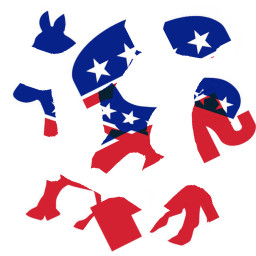I've avoided writing this post for a long time, for various reasons. For one, I recognized early on that the Tea Party was an incredibly divisive issue--like religion, those types of issues are usually best left alone. There's no convincing the non-believers, and there's no possibility of de-programming the believers. But secondly, with the movement changing by the day, I was mostly curious to see it all play out before I wrote any post-mortems.
With election day now behind us, I think the Tea Party's legacy is well-established, even if its true impact on government may not be known for years (or decades). Unfortunately, I think its legacy is one more of disappointment than anything else.
Prior to the elections, Rolling Stone's Matt Taibbi wrote a particularly scathing piece about the Tea Party that I think is entertaining and worth reading, if brutally unbalanced. I won't be so hard on the Tea Party, if only because I'm more sympathetic to its "original" goals--primarily, that of restoring fiscal sanity to the federal government. But shortly after the movement's genesis, things went horribly off the rails, for reasons that I think are systemic within our two-party democracy as it has developed.
There is a growing distrust among the American public (myself included) of both political parties. In many ways, this is a healthy part of democracy, a feeling that George Washington himself once echoed. The problem is that any alternative to the two established parties tends to attract the whackos, the extremists, the anarchists, and essentially, the shouters. The extremists are hard to mute, and pretty soon they drown out the core message and hijack the movement. That's what happened with the Tea Party, with dramatic (and sometimes disturbing) results.
So what was the solution for the "original" tea partiers, once their movement had been hijacked by the fringe? Sell out. Distance yourself from the whackos, and align somewhat closely with one of the established, "safe" alternatives. Pretty soon you had the Tea Party, brought to you in part by the G.O.P. As fellow blogger Karl Denninger became fond of saying, the Tea Party morphed into the party of "Guns, Gays, and God", a far cry from the pure fiscal conservatism that was at the core of the movement.
Clearly, the platform that developed wasn't the original point of the Tea Party movement--the historical reference in the movement's name doesn't even make any sense when applied to modern-day political platforms. But I think it's pretty close to inevitable for any third party movement. That's troubling for me, and likely for anyone who identifies as an Independent, Libertarian, or anything other than platform-Democrat or platform-Republican.
I was disappointed by the Tea Party, but only slightly more so than I've been disappointed by both of our established political parties. Hopefully, some day soon we'll have a viable third party that can resist the shouts from the whackos out on the fringe.

No comments:
Post a Comment